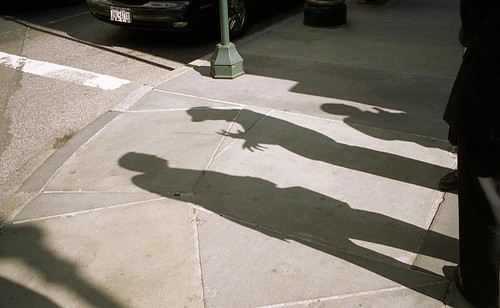Popout
Our best wishes to our family and all our friends for a Happy New Year!
Saturday, December 30, 2006
Wednesday, December 20, 2006
Women and the Two Body Conundrum

Women in Science: The Battle Moves to the Trenches (NYTimes, 12/19/06)
The New York Times has an interesting article about the "two body" conundrum facing women working in the sciences - a conflict I would argue is present for women in nearly every professional career. There are other aspects of this article surveying the inequities in the sciences that result in more women entering and then leaving the field compared to those numbers among men. However, the two body conundrum is one that is a frequent topic of conversation between my wife, a corporate lawyer, and me, a poet and photographer. Briefly, the two body conundrum is the unresolved conflict between having a career and having a family. In order for women to resolve this conflict successfully, they either have to be gifted individuals with exceptional skills that cannot be readily acquired by others or have two bodies, the punch-line being that no one can be two people. Thus the conundrum.
I think, however, it is also the answer. The focus of the article is upon emancipating women and equalizing the playing field, but it doesn't really address the underlying problem of WORK in the current era, though the article hints at the issue when it questions (through a quote from Evelyn Hammonds, professor at Harvard) whether a 70 hour work week is truly required for anyone to succeed in science. I feel the underlying problem is that contemporary models for employment & career building do not create space for the building of families or even the maintenance of a well individual. The article presents accurately that one of the most tenacious inequities women face emanates from the perception of their relationship to child-rearing as being disruptive to the dedication required for women to be serious scientists. What the article does not discuss is that this perception is based on an equivalent & opposite assumption that child-rearing will not be disruptive to a man's career, because it is institutionally assumed that men will disappear from the family during the period of time required for them to establish themselves in their field.
My father is a scientist and was an academic for 40 years. Until I was ten years old, he was barely home during the week. He left for work at 7 in the morning, returned at 6 in the evening for dinner, and then returned to the lab at 7:30 until after I was asleep. When my mother died, much of the friction in our family was the result of his realization that his absence made my mother the sole historian of those years, followed by his struggle to accept that he could not repair that absence, no matter how well intentioned his efforts might be. My father, if offered the opportunity in retrospect to be two bodies and build his career and his family simultaneously, would have signed whatever Faustian contract was required in order to do so.
The reason that the two body conundrum is difficult for women to overcome is that it is an untenable proposition for anyone - man, woman, mother, father, or parents of any configuration - commited to creating a healthy family. Individuals cannot solve the two body conundrum, because individuals by definition cannot be two bodies. In a family, the second body is the second parent, and current models of employment and career building demand that one parent MUST be absent in order for the family to generate the resources required to raise a family successfully. The current model is not healthy. People should not be doing it. Employers - universities, corporations, factories - are getting away with an unjust stipulation when they force either parent to acquiesce to those terms in order to build a career. And governments are subverting their responsibility to families in situations where a single parent is forced to manage a family without access to the resources having two bodies would otherwise present - child care, health care, and time off from work.
Thurgood Marshall was asked at the end of his career as Supreme Court justice, whether black people were better off now than they were when he first started practicing law. His answer was that the question itself was moot. People are better off now. No one is served by inequity. Humanity is lowered by what costs prejudice exacts upon the spirit of the community. So too I think in terms of women's access to an equitable workplace. I think the goal is not merely make the workplace more equitable to women. The goal is to make the work place more equitable and thus, more humane. We will all benefit from that increase - as individuals, as men, as women, and as parents.
Monday, December 11, 2006
Barack Obama so mr

Barack Obama
So Mr. Obama goes to New Hampshire. I would just like to say that I am worried about an Obama candidacy. A number of people have told me he is a tremendous orator, and that he leaves his audiences with a sense of optimism that the most difficult problems of the country are indeed difficult, but they are not impossible. I have read his speeches in written form and even without the accompanying timbre of his voice, I find them to be charismatic in the way friends have described. I wonder how conservatives hear his speeches. Do they make the most ardent supporters of the Bush administration, those individuals who still feel that Bush is doing important work in the world and is being misrepresented by people who just do not understand the imperatives of the current epoch, cringe at what they may feel to be the soft-brained, socialist pandering of a Barack Obama to the muddled masses? And considering this, I remember wondering at the heart-clutching of conservatives when they heard the words of George Bush during the 2000 and 2004 elections. The eloquence of Bush's plain-spoken (mis-spoken to liberal ears) speeches made his supporters believe that Bush was the chosen one, the candidate who would once and for all lead the country on a permanent restructuring of this United States into a land governed by conservative ideals from sea to shining sea.
While one might argue that Bush has indeed effected just such a restructuring and thusly bankrupted the country - socially, morally, financially, and any other way that remains - my initial concern was that his message had such power over so many people, and yet he had so little political experience to recommend him. Karl Rove might suggest this made him the perfect candidate - all message and potential without negative baggage to slow him down. But a good candidate does not a good leader make. I think that is fairly obvious now. Even the profoundly blind among the conservatives must admit that the man whom they once thought to be the chosen one is so only by them.
But about Obama, my worry is this: When Bush spoke, he made the hearts of conservatives leap with optimism. If there were such a thing as a conservative-to-liberal translating device that could be placed in front of Mr. Bush's mouth and translate his words from those that would make the hearts of conservatives leap to those words that would do likewise for the hearts of liberals, would we hear then the speeches of Barack Obama? Eloquence in oratory is after all the sweetest of sweet talking for most liberals awaiting political seduction. Linguistic bumbling is what made them first hate Bush, and then later, condemn those who supported him as the blind following the blind. But the presence of eloquence in Obama may make liberals equally myopic.
In terms of experience, Obama's resume is similarly thin when compared to that of Mr. Bush. He has some experience (1996-2004) at the state level as a senator representing the 13th district in Illinois. He failed in his effort to unseat Rep. Bobby Rush in the Democratic primary in 2000. He succeeded in winning his election as U.S. Senator when the Republican candidate, Jack Ryan, withdrew and was replaced by Alan Keyes, arguably the least electable person in the world. His record as a state senator was commendable - to liberals. Bush's record as governor was equally commendable - to conservatives. Obama has been lauded for his essential populism and innate understanding of the working class, a sensitivity born into him as the child of an African father and a white mother. Bush's aw-shucks attitude, his jocularity, his malapropisms and mispronunciations, were seen by many voters as signs that he was "just like us." Obama went to Columbia and Harvard. Bush went to Yale. They are as equally not "us" as they are "them" - members of the Ivy League intellectual ruling class that continues to hold sway over the government and politics of this country.
Admittedly, some of these connections are tenuous or even meaningless. The track record of Obama in the state senate does seem to reflect the conscience of someone who is honestly concerned with the health and well-being of people. And one could perhaps just as easily compare the career of Obama with that of former President Bill Clinton, who was governor of Arkansas for approximately 11 years, interrupted for 2 years by defeat. Whether Clinton will be held in posthumous esteem remains to be seen, but he currently stands as one of the best Presidents of the latter half of the Twentieth Century. Bush certainly presents no competition there.
But Bush is exactly why I worry about Obama. The world is in bad shape, and our position in this world is worse than merely bad. We can no longer afford the luxury of an inexperienced or marginally competent President, because we do not have the space available for serious mistakes. Obama cannot be held as inherently righteous, no matter how eloquent the speeches may be. Obama must meet the challenges of candidacy and satisfy the proper scrutiny of the electorate.
A President should be eloquent. Eloquence is not an asset. It is a requirement for the job of President. Concern for the health and well-being of people is a requirement for the job. Honesty is a requirement for the job. Integrity is a requirement for the job. Bush made everyone accept the rarity of positive character traits in public servants, because it served his designs on power, not our need to be powerfully represented in the world. If the men who are to lead us are truly like us, then they should be at least as honest as we are. I would argue that in matters of public concern, they should be more so.
Obama (and Hillary Clinton and Tom Vilsack - this is not an argument to interrogate one in order to protect another) should be asked many difficult questions - about foreign policy, about individual rights and freedoms, about the draconian policies of the outgoing administration, about specifics of plans for the future, budgets, diplomacy, China, Russia, the Middle East, etc. Answers should be required and time to do so should be given. If liberals are to truly become the populist party of this country, they cannot merely embrace the first person who says all the things they want to hear. That sort of embrace by the conservatives brought us Mr. Bush, a bad President who was bad because he was bad, not because he was a conservative. As liberals decide who to nominate for the 2008 presidential race, they should challenge everything and every candidate equally, even the things with which they agree wholeheartedly. Even and especially themselves.
Addendum: After discussing this point, one of my very smart friends from the Czech Republic reminded me that the concern is not so much inexperience per se, but what hangers-on inexperience may allow to access the decision making process at the highest levels of government. A President who so lacks the experience required to make decisions about the relative soundness of disparate packages of advice offered for his consideration, may in the end allow decisions to be made for him by people whose interests are not in representation of interests any larger than those of a corporate board of investors. This has undoubtedly happened during the current administration. We can so ill-afford to lose the rest of this country's relationship to the teachings of Locke, it is as if the essence of our representative government were Amazonian rainforest.
Another of my friends, who is professionally involved in politics at a high level, felt she should caution me against conflating Obama's lack of experience with that of Mr. Bush. It is one thing to be inexperienced, she said, but another thing to be inexperienced, unintelligent and devoid of the intuitive leadership skills needed to guide a country through difficult times. She conveyed to me strongly that without his powers of oratory, Obama is merely inexperienced. Bush on the other hand....
These are both points well taken.
Pinochet is dead.

From NYTimes.com's AP feed at 6:30pm, December 10th, 2006.
'''Augusto Pinochet's dictatorship in Chile represented one of the most difficult periods in that nation's history,' said White House spokesman Tony Fratto. 'Our thoughts today are with the victims of his reign and their families. We commend the people of Chile for building a society based on freedom, the rule of law and respect for human rights.'''
We are such fuckers. A quick review of history here on Wikipedia might be worthwhile to see why the above comment might just as easily be considered an insult to the people who fought to free Chile from Pinochet.
Wednesday, December 6, 2006
Alec Soth's Very Interesting Blog

I have been following Alec Soth's very interesting blog about photography, politics, photography, ethics, photography - did I mention that his blog is interesting?
Recently he asked several questions in an area (building off an article in the New York Times on the architectural photographer, Julius Schulman, who lamented the loss of people in architectural photography) that has been in the front of my head this year - that of the role of people in documentary photos and from there, the role of photojournalism in the art world.
Here is the post, along with comments, including my own which I have inserted below. The parts of the conversation preceding my comments that interested me most were those responding to a Luc Delahaye photo of a dead Taliban soldier in a ditch which was recently priced for sale at $15,000 and the Robert Polidori photographs of the devastation wrought by Hurricane Katrina. I am not so interested in the ethics of photographing these images, but rather, I am interested in the ethics of their presentation and reception.
~~~~~>
I keep thinking of the scene in Woody Allen’s film where he walks into his kitchen and there is a wall-sized reproduction of Eddie Adams’ photo of the Vietnamese police sargeant executing a VC prisoner in the streets of Saigon. That photo had immediate, terrific impact when it appeared in the press, but Allen I think recognized that very quickly it became wall decoration and that the decoration included the emotional charge of the image as well as the charge from the lack thereof. Or as Susan Sontag said, “There is the satisfaction at being able to look at the image without flinching. There is the pleasure of flinching.”
I don’t begrudge photographers like Nachtwey, Delahaye, Haviv, Kratochvil, and others the right to make a living through their work. But I wonder if the presentation of these works in galleries and museums where only a small percentage of the public goes does not merely assuage the angst of inactivity in the face of tragedy among a group of people by offering them a view of the tragedy as a surrogate for solving or rectifying the contributing factors of that tragedy. What, for example, are people to say or do upon seeing Polidori’s photographs? Buy one? Make a donation? Vote for officials who will never allow this to happen again? Or as I overheard more than a few people say in the Met where several of his New Orleans series are/were hanging, comment upon the opulently rotten beauty of the photographs and head for the Picassos.
I think we can all understand the motivation of these photographers for selling their work - most have worked for relatively low pay in exceptionally dangerous, life threatening conditions. Haviv even had a contract on his life taken out by the infamous Arkan of the Serbian paramilitary group, Arkan’s Tigers. His photo of one of Arkan’s men kicking a dead or dying woman lying on the ground is a tremendously “impactful” image. Sontag has already commented on the graceful pose of the soldier as he delivers the blow. But this image is also for sale at the Museum of War Photography in Dubrovnik. If not to hang this over their couch, what then would be the motivation of the collector who would buy this? An investment?
I don’t know. Why would you buy Luc Delahaye’s photo for $15,000 and not send $15,000 to help build a school in Afghanistan? I can only guess that the surrogacy of these images is profound - that it represents a tremendous need to do something that grows out of the activating energy of the image itself. But even then - even if it comes from the need to do something, what is being done by buying an image such as this seems profoundly impotent. Perhaps that is our current condition - that we are condemned to an explicit awareness of tragedy around us and yet continually lack what is actually required to effect change through accurately directed action.
No answers here then. Just an open and ongoing struggle to understand…
Subscribe to:
Posts (Atom)